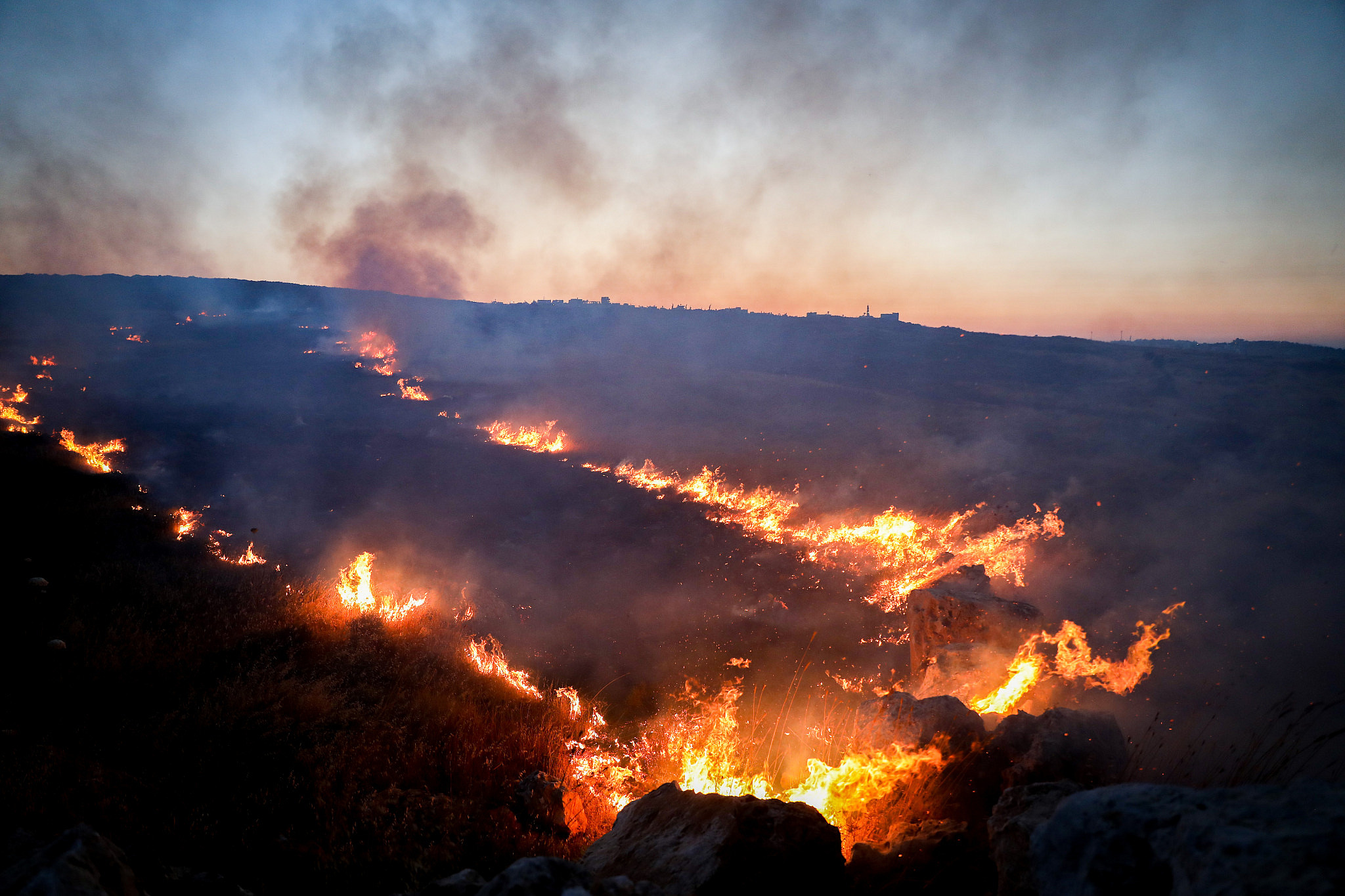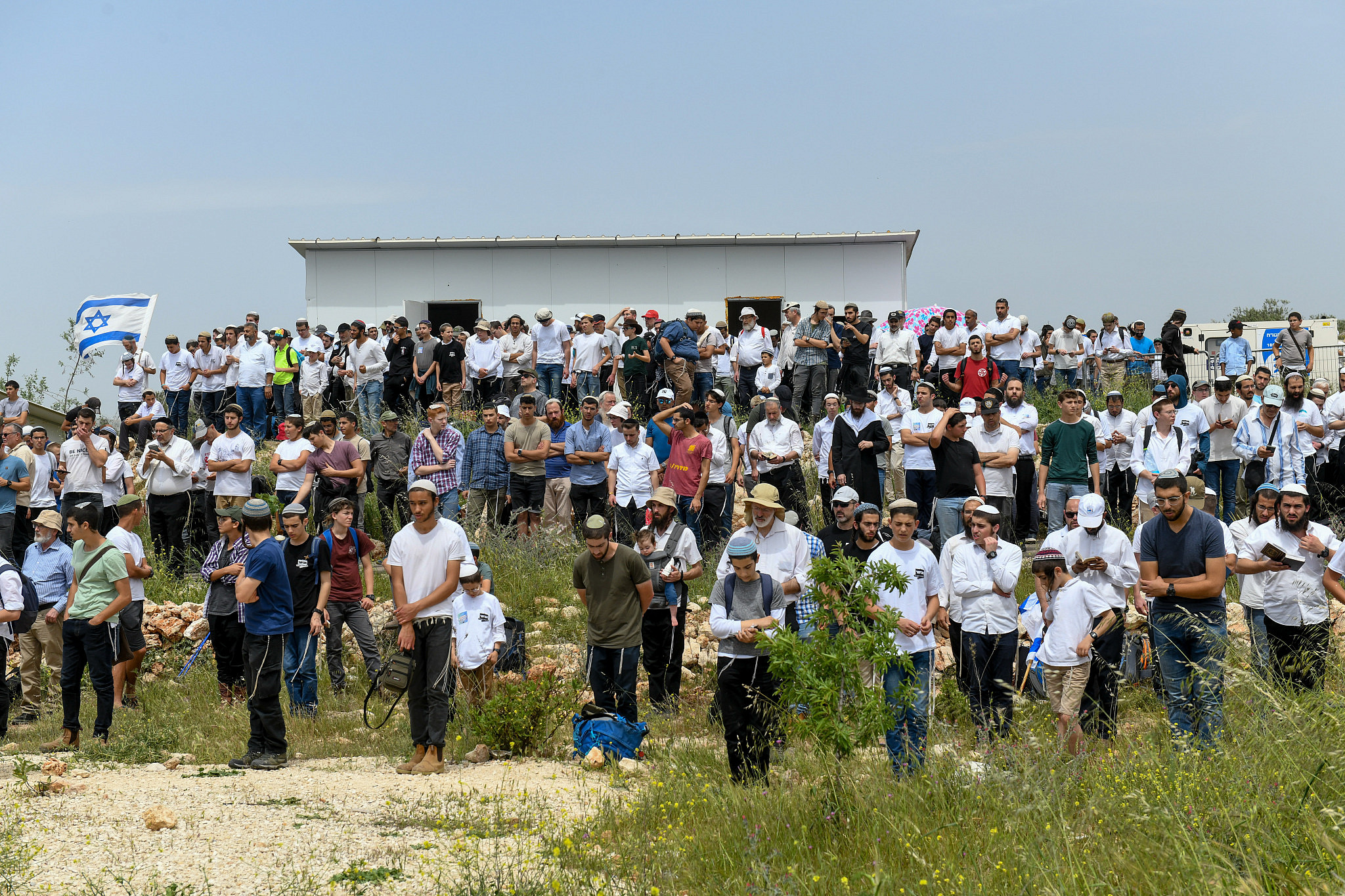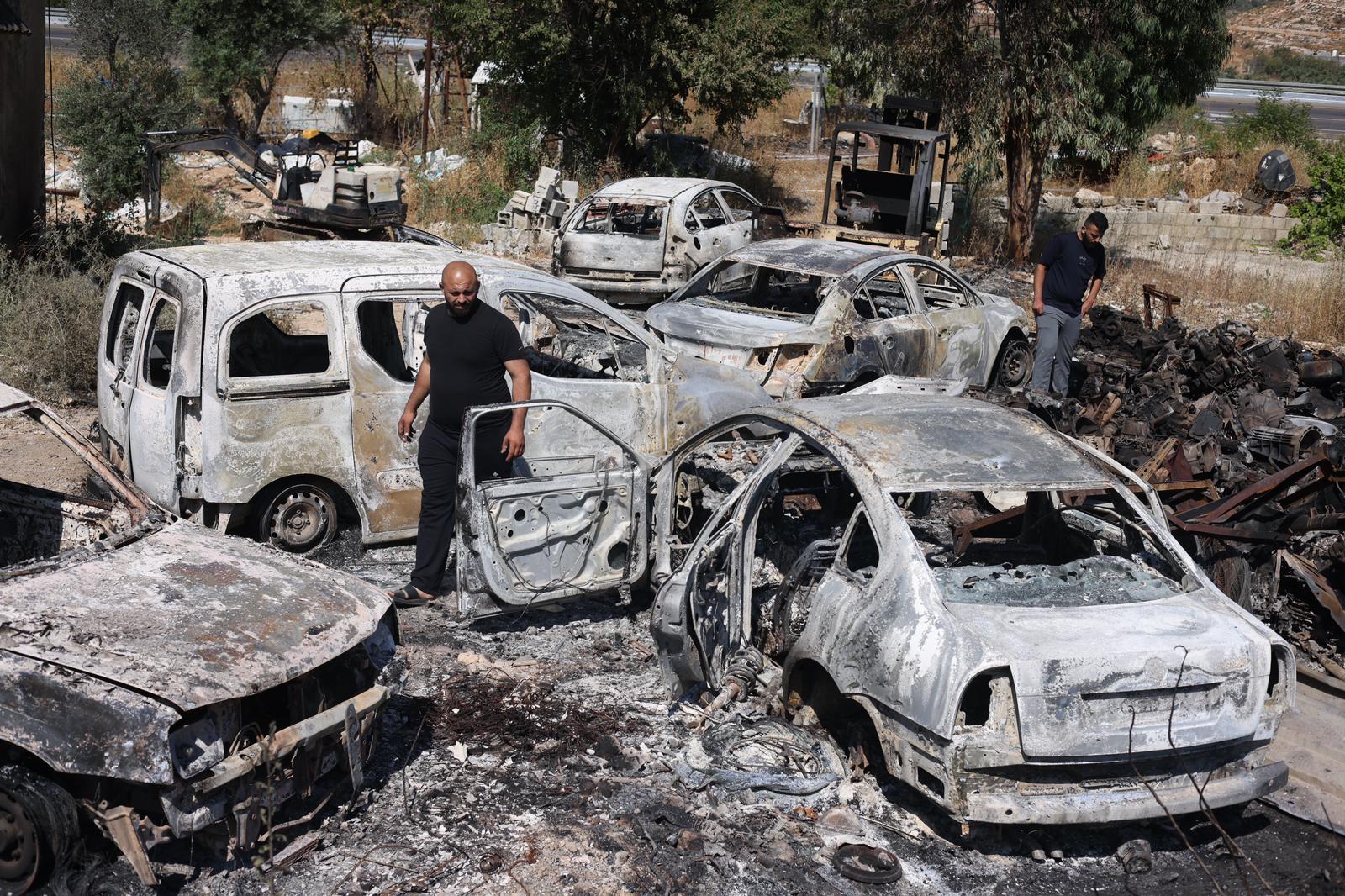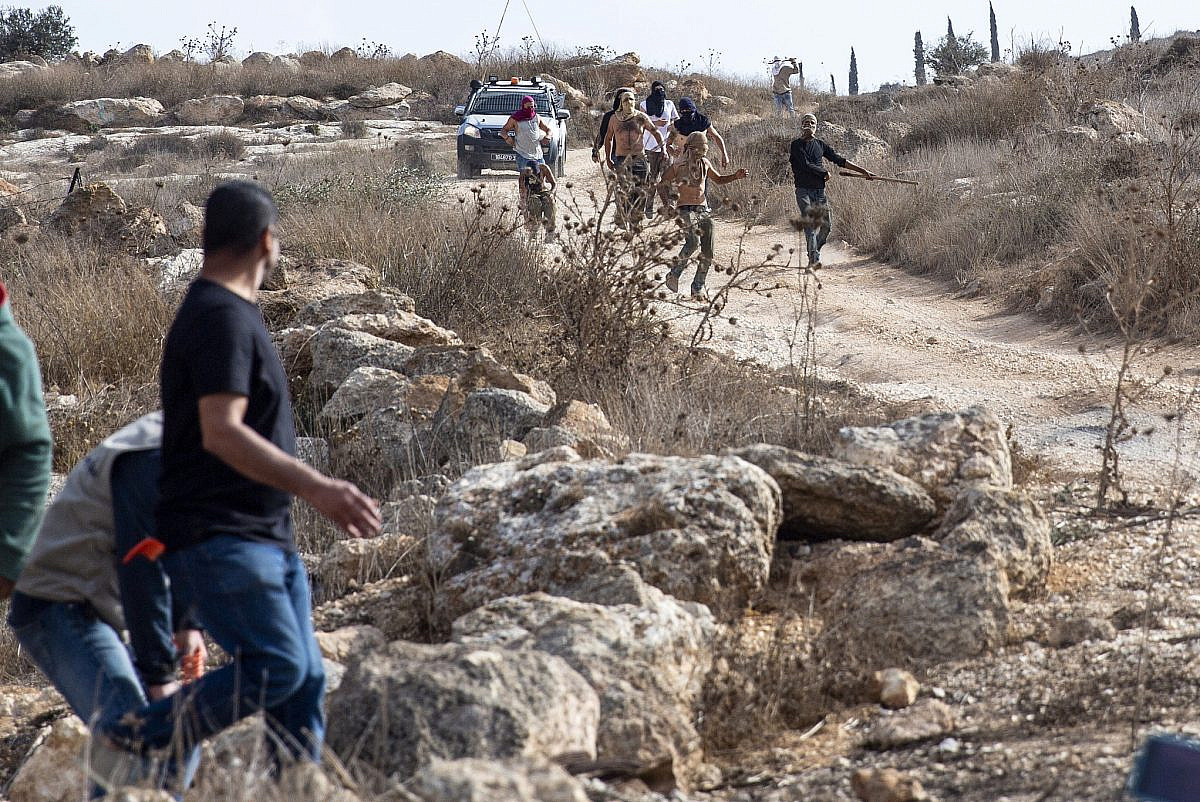Israeli settler violence against Palestinians has been escalating for several years in the occupied West Bank, a trend that is reflected not only in the rising number of attacks and attackers, but in the growing support they receive among the settler public, either actively or with silent consent. Yet one question often goes unasked: how do the settlers themselves explain — or even justify — this surge in violence?
In recent conversations I had with some settlers and experts, the narrative that emerges mainly revolves around what the settlers claim is a lack of security and insufficient activities from the Israeli army, which they say is supposed to protect them.
After the settler pogroms on the villages of Turmus Ayya, Urif, Umm Safa, and others in June, which followed the killing of four Israelis from the settlement of Eli, one resident of Eli (we’ll call him “A.”) told me that the majority of attackers are motivated by a feeling of lawlessness.
“Ask those who used violence, and 99.9 percent of them will tell you that had the army reacted more aggressively and properly [against Palestinians], they would not have resorted to such violence,” he said.
A. mentioned the attack on the village of Umm Safa, just north of Ramallah, as one example. According to him and other settlers from the area, the army did not sufficiently “handle” Palestinians who had thrown stones and blocked the main road during that weekend. This obstruction by Palestinians, A. said, effectively imposed a kind of curfew on the settlers of the area, especially those from Ateret, who could not leave or enter the settlement.
“The reaction of the [settlers] there was too violent, but the trigger was that the army simply did not respond to the attack by the Palestinians,” argued A., adding that “in the absolute majority of cases, the violence comes when people feel their backs are against the wall and feel that their lives have been abandoned.”

I asked A. what he meant by “the army not acting correctly.” Has every settler become a security expert capable of judging the situation for themselves? He answered without hesitation: “Many of us have become security experts over decades.”
A. and other settlers know very well that the Israeli army is constantly present on the ground, but for them, military conduct should focus on offensive operations. “On special occasions, we salute the army, like in Jenin,” he said, referring to the recent incursion in the city’s refugee camp. “But on a regular basis, the army doesn’t know how to act and stop Palestinian violence.
“If there was continuous, unending violence in Tel Aviv, the IDF district commander would have been sent home long ago,” he asserted. “When it happens here [in settlements], the IDF brigades don’t want to initiate activity against Palestinian violence; they operate on main roads, not inside the villages, as is expected of them, so that they can bring order. The IDF’s conduct in recent years against those who throw stones and Molotov cocktails is not working, and that is clear.”
And just to ensure that there was no doubt about his intentions, A. added: “The expectation is to move toward an attitude of ‘the landlord has gone mad’ — and that is not happening. This is what causes the outbreaks of violence.”
Two banners
Dr. Idan Yaron, a sociologist and social anthropologist at Ashkelon Academic College, who has been studying the radical right in Israel for the last decade, offered another explanation.
The national-religious settler movement, he said, has historically carried two banners: that of settling the land for Jewish habitation, and that of a broader struggle against Arabs. Both are anchored in the biblical verse that appears at the end of the Book of Numbers: “And you inherited the land, and you dwelt in it, for I gave you the land to inherit it.”

This commandment has two stages in the eyes of the movement: Jewish settlement itself [in all uninhabited parts of the historic Land of Israel], but also the active expulsion of non-Jews from the land, which in our time refers to the Palestinians.
While both have always been intertwined, according to Yaron, in the years after the 1967 war, a debate arose in the settler movement about which mission should take precedence. “For years the settlement banner came first, and those who opposed [overt] violence against Palestinians did so for pragmatic reasons, mainly because of the damage to the settlement project.”
The birth of the kind of organized settler violence we see against Palestinians today, explained Yaron, was in the settlement of Yitzhar, where rabbinical figures developed an ideology to undergird that violence based on religious texts published at the end of the 2000s.
Yaron cited an incident at Yitzhar’s Od Yosef Chai Yeshiva, after Israeli authorities issued the building a demolition order in May 2010. Rabbi Yitzhak Shapira, one of the heads of the yeshiva, warned that if one hilltop settlement in the West Bank is harmed, more will avenge it.
“It is not possible to attack one hilltop, and the hilltop or the settlement next to it will stay sleep,” said Rabbi Shapira. “There should be joint action on every hill in Judea and Samaria [the biblical names of the two regions of the West Bank]. There should be a response across the entire region.”
‘The distinction has blurred’
Settler violence against Palestinians certainly did not begin with the writings of the Yitzhar rabbis. As a former settler who worked in Yitzhar in the mid-1990s, I personally witnessed violence against Palestinian property, as well as against Israeli police in those years.

On my first day of work in Yitzhar, during a tour of the settlement in a security jeep, I saw a police car driving near the basketball court that was suddenly pelted with stones and bricks by settler children. During this period, I also heard stories about students from Od Yosef Chai who vandalized Palestinian properties and businesses in the town of Huwara. Not only was this not kept secret, there were even religious debates as to whether these kinds of attacks were permitted according to halakha (Jewish religious law).
In the past, Yaron explained, there was — in the eyes of the settlers — a delicate balance between the two banners, particularly as the founding fathers of the settlement generation sought to ingratiate themselves with the larger Israeli public, adapt to the political conditions on the ground, and curb the more outwardly extremist elements of the enterprise.
Today, though, he believes the banner of the anti-Arab struggle is growing stronger, and the balance that was once struck — and which required pragmatic, if not ideological, decisions — is no longer as essential.
What explains this change? “The current government, which is led by radical elements, is to a large extent subverting the balance that existed,” Yaron argued. “When there is no price for ‘price tag’ attacks, and the promotion of settlement is not conditioned on the maintenance of law and order, one can raise both banners at the same time, openly and proudly.” He noted as well that the state had been implementing a soft policy against settler violence long before this government came into power.
Furthermore, Yaron said that there is no longer much of a difference between the so-called “hilltop youth” — small, extremist cadres of young settlers who attack Palestinians — and the younger generation growing up in the main settlements, whom in the past were not involved in brazen violence against Palestinians. “The distinction has blurred in terms of appearance, ideology, and practice. Today, we are witnessing mass violence, rather than momentary acts of protest and anger by the extremist fringes of the settlement movement.”
Most read on +972
According to Yaron, those who recently set out for so-called “revenge” operations did not necessarily belong to the hilltop youth, but also included more normative yeshiva students, and people who likely did not participate in such violence before.
“The general consensus on the ground [among settlers] is that the security establishment is the one that should protect them, and that the army is abdicating its role. Therefore, any gap left by the army requires firm and determined action by the settlers themselves,” Yaron explained. In the end, he added, in a situation where there is no “chilling effect” on the settlers, they can “enjoy the best of both worlds.”
A version of this article first appeared in Hebrew on Local Call. Read it here.





